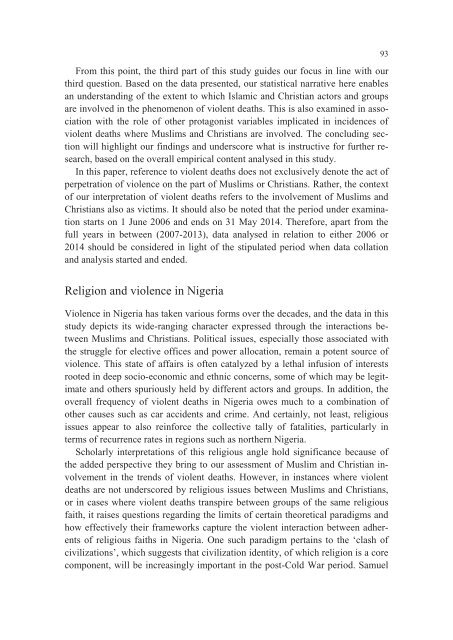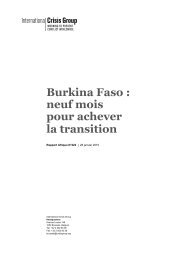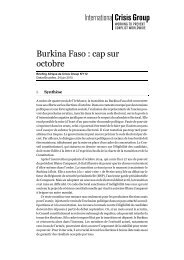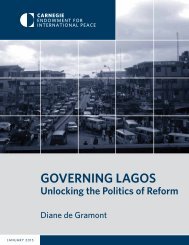Violence in Nigeria
ASC-075287668-3743-01
ASC-075287668-3743-01
You also want an ePaper? Increase the reach of your titles
YUMPU automatically turns print PDFs into web optimized ePapers that Google loves.
From this po<strong>in</strong>t, the third part of this study guides our focus <strong>in</strong> l<strong>in</strong>e with our<br />
third question. Based on the data presented, our statistical narrative here enables<br />
an understand<strong>in</strong>g of the extent to which Islamic and Christian actors and groups<br />
are <strong>in</strong>volved <strong>in</strong> the phenomenon of violent deaths. This is also exam<strong>in</strong>ed <strong>in</strong> association<br />
with the role of other protagonist variables implicated <strong>in</strong> <strong>in</strong>cidences of<br />
violent deaths where Muslims and Christians are <strong>in</strong>volved. The conclud<strong>in</strong>g section<br />
will highlight our f<strong>in</strong>d<strong>in</strong>gs and underscore what is <strong>in</strong>structive for further research,<br />
based on the overall empirical content analysed <strong>in</strong> this study.<br />
In this paper, reference to violent deaths does not exclusively denote the act of<br />
perpetration of violence on the part of Muslims or Christians. Rather, the context<br />
of our <strong>in</strong>terpretation of violent deaths refers to the <strong>in</strong>volvement of Muslims and<br />
Christians also as victims. It should also be noted that the period under exam<strong>in</strong>ation<br />
starts on 1 June 2006 and ends on 31 May 2014. Therefore, apart from the<br />
full years <strong>in</strong> between (2007-2013), data analysed <strong>in</strong> relation to either 2006 or<br />
2014 should be considered <strong>in</strong> light of the stipulated period when data collation<br />
and analysis started and ended.<br />
93<br />
Religion and violence <strong>in</strong> <strong>Nigeria</strong><br />
<strong>Violence</strong> <strong>in</strong> <strong>Nigeria</strong> has taken various forms over the decades, and the data <strong>in</strong> this<br />
study depicts its wide-rang<strong>in</strong>g character expressed through the <strong>in</strong>teractions between<br />
Muslims and Christians. Political issues, especially those associated with<br />
the struggle for elective offices and power allocation, rema<strong>in</strong> a potent source of<br />
violence. This state of affairs is often catalyzed by a lethal <strong>in</strong>fusion of <strong>in</strong>terests<br />
rooted <strong>in</strong> deep socio-economic and ethnic concerns, some of which may be legitimate<br />
and others spuriously held by different actors and groups. In addition, the<br />
overall frequency of violent deaths <strong>in</strong> <strong>Nigeria</strong> owes much to a comb<strong>in</strong>ation of<br />
other causes such as car accidents and crime. And certa<strong>in</strong>ly, not least, religious<br />
issues appear to also re<strong>in</strong>force the collective tally of fatalities, particularly <strong>in</strong><br />
terms of recurrence rates <strong>in</strong> regions such as northern <strong>Nigeria</strong>.<br />
Scholarly <strong>in</strong>terpretations of this religious angle hold significance because of<br />
the added perspective they br<strong>in</strong>g to our assessment of Muslim and Christian <strong>in</strong>volvement<br />
<strong>in</strong> the trends of violent deaths. However, <strong>in</strong> <strong>in</strong>stances where violent<br />
deaths are not underscored by religious issues between Muslims and Christians,<br />
or <strong>in</strong> cases where violent deaths transpire between groups of the same religious<br />
faith, it raises questions regard<strong>in</strong>g the limits of certa<strong>in</strong> theoretical paradigms and<br />
how effectively their frameworks capture the violent <strong>in</strong>teraction between adherents<br />
of religious faiths <strong>in</strong> <strong>Nigeria</strong>. One such paradigm perta<strong>in</strong>s to the ‘clash of<br />
civilizations’, which suggests that civilization identity, of which religion is a core<br />
component, will be <strong>in</strong>creas<strong>in</strong>gly important <strong>in</strong> the post-Cold War period. Samuel






